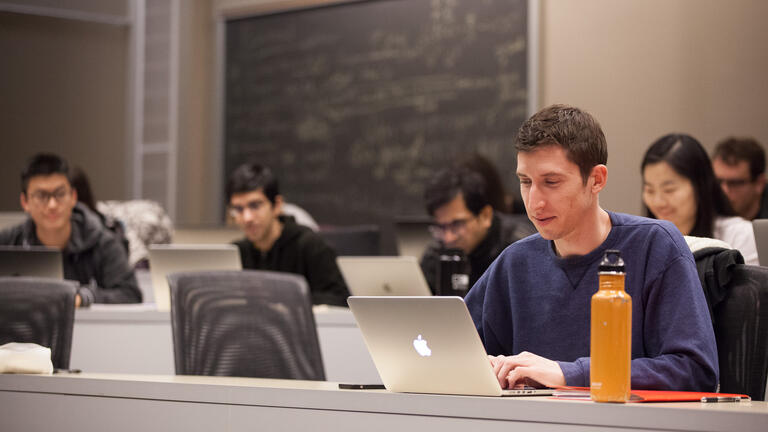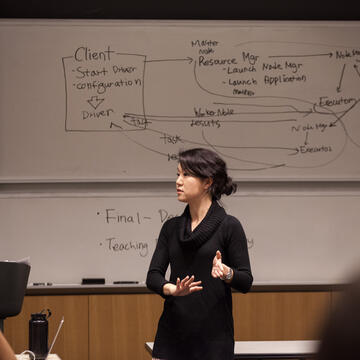
Clinical Neuroinformatics & AI Laboratory
The promise of the Clinical Neuroinformatics & AI Laboratory is to enable a more personalized approach to healthcare that considers health as an interconnected whole. Personalized healthcare requires integration of complex information about the whole person or Cura Personalis: genetics, physiology, medical history, mental health.
The Clinical Neuroinformatics & AI Laboratory (CNAIL) brings together faculty and staff from both the College of Arts and Sciences and the School of Nursing and Health Professions, together with clinical partners to develop computational algorithms to enable holistic personalized healthcare. The CNAIL has particular expertise and focus on mental, neurological, and neurodevelopmental disorders and their role in health through the lifespan.
What is CNAIL?
CNAIL represents a research paradigm that is agile, cross-institutional and multidisciplinary. The Clinical Neuroinformatics & AI Laboratory provides an opportunity for students and scholars to support medical research across many specialties by providing expertise in data science and related areas of biomedical informatics to basic and clinical researchers. Data Institute students, postdocs and faculty have partnered with researchers at Harvard Medical School, Stanford AIMI, Salk Institute, Georgetown Medical and UCSF, among others, to develop novel open source ML/AI models to solve challenging medical problems. In addition to supporting principal investigators at other institutions, CNAIL faculty have specific expertise in neurological and neurodevelopmental disorders, and integrated mental health and are leading research teams in these areas.
Over the past several years, 32 projects involving 36 students, 4 postdoctoral fellows, and 9 USF faculty have worked across 15 research labs at 7 universities. Some highlights of breakthrough results include:
- Developing a state of the art AI software system that automatically identifies dangerous brain swelling in ER patients
- Discovery of new brain electrical activity regions of patients to aid in early detection of Schizophrenia
- An optimized machine learning approach to radiation dosing treatment plans that improve protection of the vital organs of cancer patients
- Advanced a deep learning system to speed up medical microscopy image capture, allowing for increased capacity and speed of testing, diagnosis and research
- Discovery of electrophysiological biomarkers for early autism detection.
- Discovery and investigation of electrophysiological biomarkers for several childhood epilepsies
Memberships & Projects
The Clinical Neuroinformatics & AI Laboratory, formerly WAMRI, provides researchers the opportunity to focus on utilizing artificial intelligence models to advance critical medical research across areas including but not limited to oncology, cardiology and neurology.
Become a Member
The Clinical Neuroinformatics & AI Laboratory at the Data Institute extends membership benefits to qualifying private, public and nonprofit organizations. Typically, membership agreements are evaluated and renewed annually. For companies with a stable and vibrant flow of challenging data problems, longer term agreements are available:
- Companies that commit to a two (2) year membership receive a 10% discount
- Companies that commit to a three (3) year membership receive a 20% discount
We would love to help you analyze your organization's medical data, whether it be imaging, text, tabular, genomic, or any other type (or a mixture of types) by developing a collaborative project. We can provide the data science expertise from our faculty and mentors; we would need you to provide the medical data and medical expertise, and to work closely with our data scientists. Projects are generally academic in nature - that is, the end product will be an academic paper or similar.
For questions and pricing information, please contact Elisabeth Merkel and Victor Palacios at datainstitute@usfca.edu.
Projects & Research
Clinical Neuroinformatics & AI Laboratory was initially funded by Wicklow Capital and previously known as the Wicklow AI Medical Research Initiative (WAMRI). This initiative provides researchers the opportunity to focus on utilizing artificial intelligence models to advance critical medical research across areas including oncology, cardiology and neurology.
Our People
-
- William Bosl, Scientific Director
- Jeff Hamrick, Senior Director of the Data Institute
- Elisabeth Merkel, Director of Operations
- Victor Palacios, Director of Partnerships
-
- Tobias Loddenkemper, MD, Harvard / BCH, tobias.loddenkemper@childrens.harvard.edu
- Michelle Bosquet Enlow, PhD, Harvard / BCH, michelle.bosquet@childrens.harvard.edu
- Kenneth D. Mandl, MD, Harvard/ BCH, kenneth.mandl@childrens.harvard.edu
- Charles A. Nelson, PhD, Harvard/ BCH, charles.nelson@childrens.harvard.edu
- Kiran Maski, MD, Harvard / BCH, Kiran.Maski@childrens.harvard.edu
- Eric London, MD, Mt. Sinai Hospital, NY, and NY State Institute for Basic Research, naarlondon@gmail.com
- Teguo Daniel, MPH, Global Organization for Health Education and Harvard School of Public Health, teguodjoyum@hsph.harvard.edu
- Lucien Kilonda, Global Organization for Health Education and CEO, Purple Point Neurodiagnostics, lucien@gohealthed.org
-
The AI & Medicine Initiative was initially funded by Wicklow Capital and previously known as the Wicklow AI Medical Research Initiative (WAMRI).
Jeremy Howard, WAMRI Chairman, Founder Fast.ai
Jeremy Howard is an entrepreneur, business strategist, developer, and educator. Jeremy is a founding researcher at fast.ai, a research institute dedicated to making deep learning more accessible. He is also a former faculty member at the University of San Francisco, and CSO at doc.ai and platform.ai.Jeremy’s most recent startup, Enlitic, was the first company to apply deep learning to medicine. He was previously the President and Chief Scientist of the data science platform Kaggle, where he was the top ranked participant in international machine learning competitions 2 years running. He was the founding CEO of two successful Australian startups (FastMail, and Optimal Decisions Group–purchased by Lexis-Nexis). Before that, he spent 8 years in management consulting, at McKinsey & Co, and AT Kearney.
He has many television and other video appearances, including as a regular guest on Australia’s highest-rated breakfast news program, a popular talk on TED.com, and data science and web development tutorials and discussions.
David Uminsky, WAMRI Board Member, former USF Director MS in Data Science & Data Institute, current Executive Director of the Data Science Institute at the University of Chicago
David Uminsky is the former director for the USF MS in Data Science program and Data Institute, and current Executive Director of the Data Science Institute at the University of Chicago. His research interests are in applied mathematics. He is interested in unsupervised machine learning, data clustering, algebraic signal processing, as well as pattern formation, dynamical systems and fluids. David was selected in 2015 by the National Academy of Sciences (NAS) as a Kavli Frontiers of Science Fellow. Each year, 100 researchers under the age of 45 are selected by the academy, and the 20% of the current NAS were previous Kavli Fellows. He is also the founding director of the Bachelor's program in Data Science at University of San Francisco. Before joining USF, he was a combined National Science Foundation and UC President's Fellow at UCLA, where he was awarded the Chancellor's Award for postdoctoral research. This award is given to approximately top 20 postdocs out of over a thousand who qualify for consideration. He holds a PhD in Mathematics from Boston University and a BS in Mathematics from Harvey Mudd College.Fred Monroe, Research and Support, Wicklow Capital
Fred Monroe is a machine learning researcher, serial entrepreneur, software developer, trader and investor with over twenty five years of experience working at the forefront of technology. He is working to apply advances in deep learning and artificial intelligence (AI) to important real-world problems like those studied at WAMRI.Fred also works for Wicklow Capital, a family office which makes investments across a wide range of early stage companies. Fred helps Wicklow assess investments and donations, particularly when related to artificial intelligence.
Upcoming Events
Donate
The Clinical Neuroinformatics & AI Laboratory received its initial funding from Wicklow Capital. We are currently seeking a donor or donors to fund specific high-risk, high-impact research projects in neurological and neurodevelopmental biomarker discovery and clinical testing. These projects are based on ground-breaking research by our scientific director, Dr. Bosl, with his collaborators at Harvard Medical School and Boston Children’s Hospital.
Data Institute
San Francisco, CA 94105
Mon-Fri, 9 a.m. - 5 p.m.



